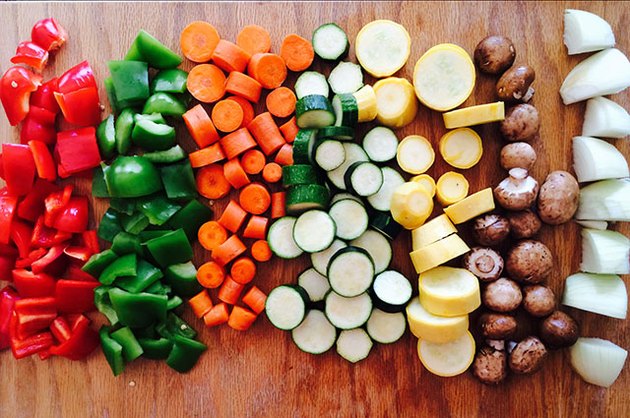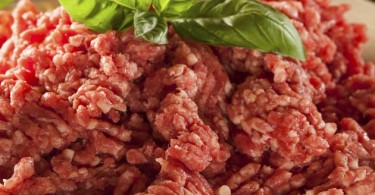If you’ve embraced a meat-free lifestyle, kudos to you! Research shows that vegetarians have a lower risk of heart disease, high blood pressure, diabetes and some forms of cancer. But you may be perplexed by the pounds that you unexpectedly accumulated after dropping meat from your diet.

Advertisements
I gave up burgers, wings, sausage and other fatty meats — and I gained weight! How is that possible? There’s not a single answer for everyone, but here are six mistakes that may explain why:
1. You forget to include protein at each meal.
This spells hunger and trouble for your waistline. Protein helps you to feel satiated and takes longer to digest than carbohydrates (four to six hours versus one to four hours, respectively) and without it, you reach for food more often. Make sure you include a serving of meat-free protein at each meal. If you’re a lacto-ovo vegetarian, try nonfat or low-fat Greek yogurt or other fat-free or low-fat dairy products or eggs as a source of protein. Pesca-vegetarians can include fish for protein. If you avoid all animal products, try pulses like legumes, split peas and lentils, tofu, nuts, nut butters and hummus.
2. You eat too many processed and/or starchy carbs.
Without meat on the plate, there is more space for other items — like an extra helping of carbs. Large portions of pastas, potatoes and other grains add up quickly in calories. Plus, they’re digested more rapidly than protein, so you’ll be back for more soon.
An easy fix? Replace the spot that meat took on the plate with non-starchy veggies and non-meat protein sources to feel full and keep the calories in check. Think zucchini and black beans or cucumbers with a dill Greek yogurt dip.
3. You assume “meat-free” automatically equals healthy.
You can live on potato chips, cookies, candy and soda and still by definition be a vegetarian! Many vegetarian newbies aren’t sure what to eat when they cut out meat. They munch between meals on meat-free snack foods that provide a lot of extra calories (and not many nutrients), which can lead to weight gain. Ironically enough, these vegetarians miss out on the benefits of becoming a vegetarian and fall short on nutrient-rich foods like fruits, veggies, whole grains and plant-based protein sources. Choose foods that are wholesome and nutrient-rich, regardless of whether or not you eat meat.
4. You place a hefty (pun intended) emphasis on nuts, seeds, avocados and their oils.
There’s no doubt about it: These foods are packed with nutrients, have cancer-fighting benefits and contain heart-healthy fat. However, these foods come with a calorie-loaded punch. One cup of many nuts contains close to 1,000 calories, so after snacking on a few handfuls, you’ve nearly consumed your daily calorie quota from the nuts alone.
That healthy avocado on your sandwich? That can add 300 calories or more that you didn’t bargain for. Portion control is the key when it comes to enjoying these calorie-dense healthy foods and avoiding weight gain. Become familiar with serving sizes to avoid overconsuming calories. One ounce (about 1/5) of an avocado is 50 calories, one flat tablespoon of oil is 120 calories, or one ounce of nuts (equals 14 shelled walnut halves, 16 cashews, 24 shelled almonds).
Advertisements
5. You assume that prepared or packaged food that says “vegetarian” is low-calorie.
Ahem, have you ever seen the calorie count on some foods labeled as vegetarian? Frozen meals like macaroni and cheese, burritos and pizza can pack in 800 to 1,000 calories — just shy of the 1,200 to 1,500 that some small women should get in an entire day, especially if they’d like to lose weight! And snack foods are so easy to overeat that they, too, can set you back a few hundred calories at a minimum.
For example, a vegan muffin contains no animal products, but many are packed with sugar and oil and, with 400 to 450 calories, rival a McDonald’s Quarter Pounder (417 calories). While kale chips are healthy, a single handful (one-ounce serving) can set you back 150 calories, a far cry from the 14 calories in one ounce of kale.
6. You order the vegetarian entree at restaurants.
Choosing the veggie options seem like the obvious choice. But the unfortunate truth is that vegetarian entrees are often packed with calories because they contain a lot of cheese, oil or nut-based sauces (such as a pine-nut pesto) that are often more than double the calories compared to their grilled poultry and vegetable counterparts. The solution: Watch your portion sizes, request “light on the cheese,” sauces on the side and veggies steamed.
Tammy Lakatos Shames and Lyssie Lakatos, The Nutrition Twins®, are twin sisters and nationally recognized registered dietitians and personal trainers with more than 15 years of experience. Through their books, media appearances, nutrition counseling, lectures and blogs, they’ve built a brand that empowers people to take charge of their health and make changes that last a lifetime.
The duo are the authors of The Nutrition Twins’ Veggie Cure: Expert Advice and Tantalizing Recipes for Health, Energy and Beauty, Fire Up Your Metabolism and The Secret To Skinny: How Salt Makes You Fat. They have been featured as experts on The Doctors, Good Morning America Health, Fox and Friends, Discovery Health, USA Today, Health magazine and Vogue. They are experts and bloggers for the host of Dancing With the Stars’ Brooke Burke’s website, as well as for The American Council on Exercise (acefitness.org). They also work with Wonderful Pistachios. Tammy and Lyssie live in New York City, where they enjoy running and biking (as well as chasing after Tammy’s twin daughters) to keep fit.
Visit them at NutritionTwins.com, and follow them on Twitter, Instagram, Facebook and Pinterest.
Ding H, Chin YW, Kinghorn AD, et al. Chemopreventive characteristics of avocado fruit. Semin Cancer Biol. 2007 May 17; [Epub ahead of print] 2007.
Wu L, Wang Z, Zhu J, Murad AL, Prokop LJ, Murad MH. Nut consumption and risk of cancer and type 2 diabetes: a systematic review and meta-analysis. Nutr Rev. 2015;73(7):409-425.





Comments